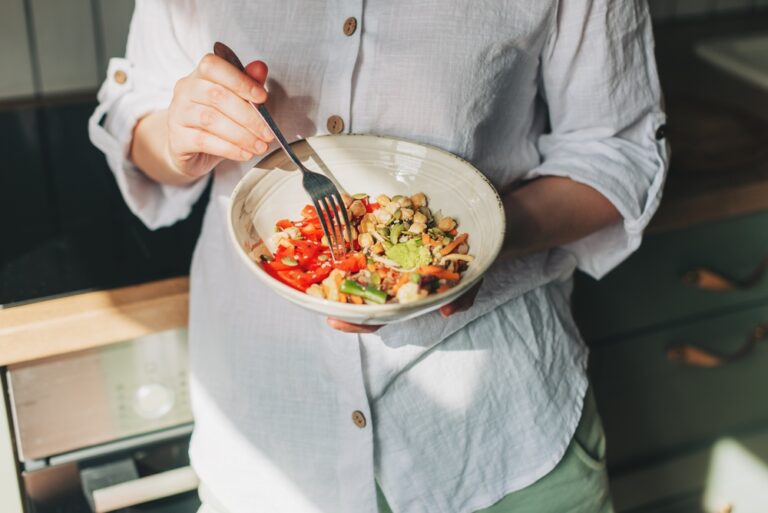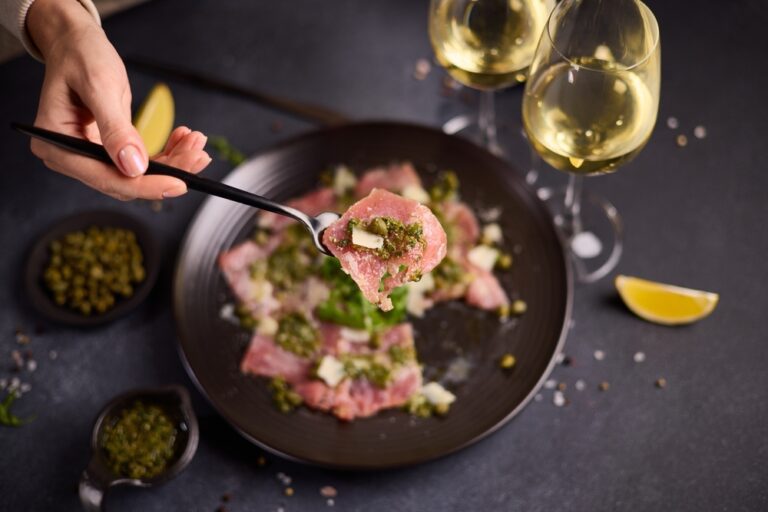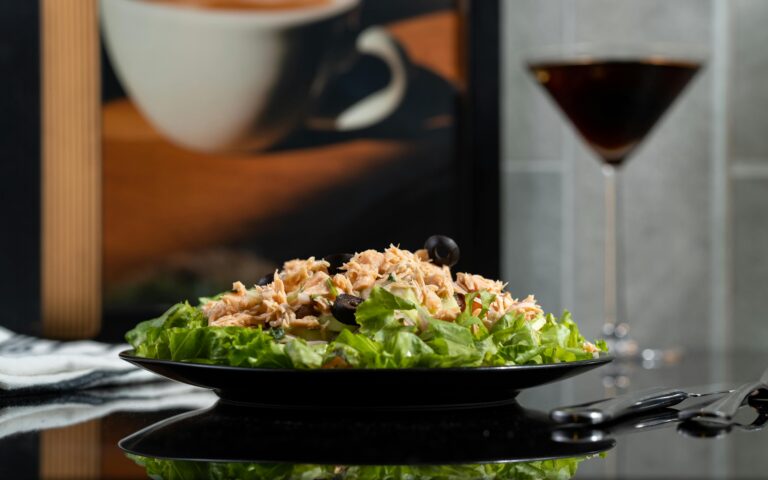As many as 90% of pregnant women report unusual food urges, everything from sugary snacks to weird cravings like dirt or ice. These intense desires are driven by shifting hormone levels such as increases in progesterone, estrogen, and neuropeptide Y, which amplify appetite, change how foods taste and smell, and boost the drive to eat. Similarly, many women crave tuna fish while pregnant, and we have found many women asking, “Why am I craving tuna while pregnant?”, While tuna cravings are harmless and fine to satisfy in moderation, they often point to real nutritional needs or imbalances.
- Why Am I Craving Tuna?
- Top 6 Reasons You Crave Tuna While Pregnant
- Is Tuna Safe During Pregnancy?
- Alternatives to Satisfy Your Tuna Craving
- Easy, Pregnancy Friendly Tuna Recipes You Can Try
- Why Am I Craving Seafood in General?
- Is Tuna Fish Easy to Digest?
- Can You Eat Tuna Straight Out of the Can?
- Is Craving Fish a Sign of Pregnancy?
- FAQ’s
- Conclusion
In this guide, we’ll demystify the craving meaning, explore tuna and pregnancy, and answer every question from “Is canned tuna healthy?” to “Can I eat tuna every day?”, all while keeping you and baby safe.
Why Am I Craving Tuna?
A craving meaning isn’t just “wanting” food; it’s often your body signaling a need, be it nutrients, comfort, or even salt. During pregnancy, these signals intensify. The question “Why am I craving tuna?” isn’t random. Cravings often signal hormonal shifts or emotional needs.
Top 6 Reasons You Crave Tuna While Pregnant

1. Omega-3 and DHA Needs
Tuna is a potent source of DHA/EPA, essential for fetal brain and eye development. Craving seafood or specifically craving fish can mean your body seeks these healthy fats.
Dr. Emily Carter, a registered dietitian, states,
“Many pregnant women crave fish because their bodies need more DHA and EPA, the essential omega-3s found in tuna. These nutrients support the baby’s neurological and visual development.”
2. You Actually Need Proteins
During pregnancy, your body requires additional protein to support fetal growth, and that’s why you get protein cravings. Tuna delivers lean protein, key for building baby’s tissues. If you’ve ever had a craving for protein, tuna is your go-to.
3. Iron and Anemia
Iron deficiency in pregnancy is common. Tuna contains heme iron, so a tuna craving meaning could be low iron stores.
4. Salt and Electrolytes
If you’re craving tuna fish and crackers, your body might be asking for sodium. Many canned tuna products contain added salt, which may satisfy salt cravings.
5. Hormonal & Sensory Shifts
Progesterone and estrogen heighten taste and smell, making the umami-rich flavor of tuna irresistible.
6. Emotional Comfort
Craving food like tuna salad can feel like a warm hug when you’re tired or stressed.
If you’re curious about other seafood cravings, you’ll love our guide on craving oysters while pregnant aswell.
Is Tuna Safe During Pregnancy?
Tuna packs a powerful nutritional punch, every 3‑ounce serving delivers about 20 g of high‑quality protein, plus essential minerals like iron (for red blood cells) and selenium (an antioxidant), fat‑soluble vitamins D and B₁₂, and the long‑chain omega‑3s DHA and EPA that support your baby’s brain and eye development as well as your own immune health and energy levels.

However, because larger tuna species can accumulate methylmercury, a neurotoxin that may harm a developing nervous system if eaten in excess, pregnant women are advised to choose low-mercury options (like canned light or skipjack tuna). For higher-mercury varieties such as albacore (“white”) tuna, keep intake to no more than one 4-ounce serving weekly, and always drain and rinse canned tuna to reduce any added sodium. By balancing tuna’s nutrient benefits with these safety guidelines, you can enjoy its savory flavor and nourishment without worry.
1. How Often Can I Eat Tuna?
The FDA recommends that pregnant women eat no more than 2-3 servings (8-12 ounces) of low-mercury fish per week. Light tuna is a safer choice compared to albacore.
Mercury Levels:
Tuna contains methylmercury, which can harm fetal development. However, not all tuna is equal:
- Canned Light Tuna: Lower in mercury; safe to eat 2–3 servings/week.
- Albacore (White) Tuna: Higher mercury; limit to 1 serving/week.
- Wild-Caught vs. Farmed: Is wild-caught tuna good for you? Yes—it often has fewer contaminants than farmed varieties.
The FDA guidelines state,
“Pregnant women can safely consume 8–12 oz of low-mercury fish like light tuna weekly.”
2. Is Starkist Tuna Healthy for Pregnant Women?
Starkist tuna and Chicken of the Sea tuna are popular choices. Nutritionally, both provide lean protein and omega-3s, but opt for low-sodium versions to manage blood pressure.
Dr. Lisa Nguyen, OB-GYN, advises:
“Check labels for ‘pole-caught’ or ‘skipjack’ tuna—they’re typically lower in mercury.”
3. Are Tuna Packets Healthy?
If you prefer convenience, are tuna packets healthy? Yes, but always check the label for added ingredients like sodium and preservatives.
Alternatives to Satisfy Your Tuna Craving
If you’re cautious about mercury intake but still experiencing a strong cravingness for seafood, consider these safer alternatives:
- Salmon, A great source of omega-3s and low in mercury.
- Sardines, Packed with calcium and omega-3s.
- Eggs and Nuts, Provide protein and essential fatty acids.
- Seaweed, A natural source of iodine.
Easy, Pregnancy Friendly Tuna Recipes You Can Try

1. Light Tuna & Avocado Salad
Toss drained tuna with mashed avocado, lime juice, chopped cilantro, and a pinch of pepper. Serve on whole-grain crackers for a satisfying snack.
2. Mediterranean Tuna Wrap
Combine tuna with diced tomatoes, cucumbers, olives, and a drizzle of olive oil. Roll in a whole‑wheat tortilla.
3. Protein Packed Tuna Bowl
Over brown rice, layer tuna, steamed broccoli, shredded carrots, and edamame. Top with a light soy-ginger dressing.
Why Am I Craving Seafood in General?
Beyond tuna, you might find yourself craving seafood in general. This can be due to:
- Zinc deficiency: Essential for immunity and fetal development.
- Iodine needs: Important for thyroid function.
- Taste preference shifts: Pregnancy hormones can alter your taste buds, making seafood more appealing.
Is Tuna Fish Easy to Digest?
Pregnancy can affect digestion, making some foods harder to process. Light tuna is generally easy to digest, but heavy or oily preparations may cause discomfort. If you’re prone to digestive issues, try eating pouch tuna or pairing tuna with easy-to-digest foods.
Can You Eat Tuna Straight Out of the Can?
A common question is, “Do you eat tuna out of the can?” Yes, you can, as long as it’s properly stored and from a reputable brand. However, draining excess oil or brine can make it healthier.
Tuna and Pregnancy: The Final Verdict
If you’re craving tuna fish while pregnant, it’s usually a sign that your body needs essential nutrients. While it’s safe to consume in moderation, be mindful of mercury levels and opt for safer fish alternatives when possible.
Dr. Lisa Thompson, an OB-GYN, advises,
“Pregnant women should enjoy tuna in moderation, ensuring they choose low-mercury options and balance their diet with other nutrient-rich foods.”
Is Craving Fish a Sign of Pregnancy?
While craving seafood isn’t a definitive pregnancy test, sudden aversions or urges for specific foods (like tuna) are common early symptoms. A 2022 study in Appetite Journal found that 65% of pregnant women reported seafood cravings, often linked to nutrient-seeking behavior.
FAQ’s
1. How often can I eat tuna?
The FDA recommends consuming light tuna, such as skipjack, up to 2-3 servings per week. Albacore tuna, which has higher mercury levels, should be limited to one serving per week. Always consider individual health conditions and consult guidelines.
2. Can I eat tuna straight from the can or pouch?
Absolutely. Tuna in cans or pouches is pre-cooked and safe to eat directly. It’s a convenient option for quick meals or snacks
3. Is craving tuna fish while pregnant normal?
Yes, many pregnant individuals crave certain foods, including tuna, due to hormonal changes and increased nutritional needs. However, it’s crucial to monitor tuna intake during pregnancy because of mercury concerns. Consult your healthcare provider for personalized advice.
4. Is wild-caught tuna better for you?
Wild-caught tuna often has higher omega-3 fatty acid levels and may contain fewer contaminants compared to farmed varieties. However, sustainability and mercury levels should also be considered when choosing tuna products.
5. Is tuna fish and crackers a healthy snack?
Tuna paired with whole-grain crackers can make a balanced snack, providing protein, healthy fats, and complex carbohydrates. Be mindful of portion sizes and opt for low-sodium options when possible.
Conclusion
So, why am I craving tuna? The answer lies in your body’s need for essential nutrients like omega-3s, protein, and iron. While craving fish is common during pregnancy, always be mindful of your tuna intake to ensure a healthy pregnancy. If your cravingness persists, try safer seafood options to meet your nutritional needs.
Always consult with a healthcare professional or nutritionist for personalized dietary advice.








